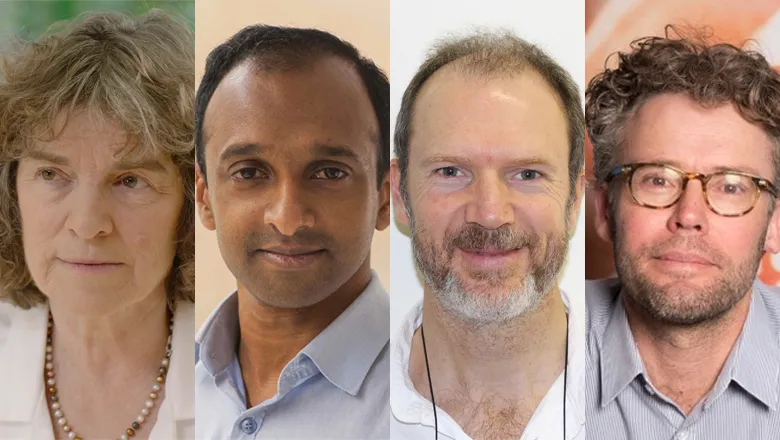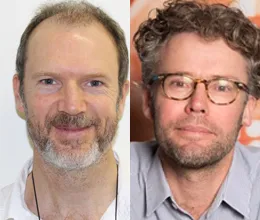Professor Karen Steel, Dr Jemeen Sreedharan, Professors Crick Lund & Mark Jordans have individually received funding awards from Wellcome Trust

The Wellcome Trust has awarded three large funding awards to IoPPN researchers Professor Karen Steel, Dr Jemeen Sreedharan, Professors Crick Lund and Mark Jordans.

Professor Karen Steel received a Wellcome Investigator Award of £1,947,704 for 'Determining the limits for reversing hearing loss.' The project will investigate whether some types of hearing loss can be reversed and develop new methods for diagnosing which structures within the inner ear are malfunctioning. This knowledge will be important to focus efforts on developing new treatments for the types of hearing loss that are most likely to respond, and to select the best treatment for each individual depending on what the problem is. The project will use mutant mice with similar types of dysfunction as in human deafness, which will have the advantage of knowing exactly what is going on inside the ear including the primary site of the pathology.
Hearing loss is very common as we get older, isolating affected people from society, but we have no treatments available that can stop or even slow down its progression. In this new project, we will investigate whether some types of hearing loss can be reversed.– Professor Karen Steel, Professor of Sensory Function, Wolfson Centre for Age Related Diseases
Dr Jemeen Sreedharan received a Wellcome Senior Fellowship of £1,973,118 to investigate TDP-43 misregulation in neurodegeneration. Amyotrophic lateral sclerosis (ALS) and frontotemporal dementia (FTD) are devastating brain diseases linked to disturbances in the protein TDP-43. Dr Sreedharan's project will identify how TDP-43 expression is regulated in health and disease, and determine how this ubiquitously expressed protein causes selective vulnerability in the brain. The project will use RNA-protein interaction assays and proteomics to characterise the network of proteins involved in TDP-43 autoregulation. It will recreate UTR variants in human cells using CRISPR and determine their effect on TDP-43 expression and neuronal viability. Finally, the project will examine the brain transcriptome in situ in TDP-43 mutant mice to elucidate mechanisms underlying regional brain vulnerability in ALS-FTD.
The support from the Wellcome Trust is generous and a big relief having come at a tough time for us all. I am immensely grateful to Wellcome for having faith in me, King's and my collaborators. The funding will support me and three scientists for 5 years to investigate TDP-43 misregulation, something I think plays an important causative role in motor neuron disease and dementia. My plans are ambitious, exciting and will move us closer to developing therapies for these incurable conditions.– Dr Jemeen Sreedharan, van Geest Post Doctoral Fellow in Neurodegeneration, Department of Basic & Clinical Neuroscience

Professors Crick Lund and Mark Jordans received a Collaborative Award of £4,020,832 over 5 years for 'ALIVE: Improving Adolescent mentaL health by reducing the Impact of poVErty'. Depression and anxiety are leading contributors to the burden of disease among adolescents in low- and middle-income countries (LMIC), and they disproportionally affect adolescents living in poverty. The aim of the project will be to develop and pilot-test an intervention that equips adolescents with skills to escape poverty and strengthens self-regulation, thus preventing adolescent depression and anxiety in urban LMIC settings.
We have been conducting research for some time on cycles of poverty and mental illness in low and middle-income countries. So we are particularly excited about this new study funded by the Wellcome Trust, called 'Improving Adolescent mental heaLth by reducing the Impact of poVErty (ALIVE).– Professor Crick Lund, Professor of Global Mental Health and Development, Centre for Global Mental Health
The study objectives are to: (1) identify the causal mechanisms linking poverty, self-regulation, and depression and anxiety among adolescents (age 10-19 years); (2) collaboratively develop a multi-component selective prevention intervention targeting self-regulation and skills for academic and employment success among adolescents at high risk of developing depression or anxiety living in urban poverty in Colombia, Nepal and South Africa; (3) adapt and validate key instruments to measure eligibility, implementation, mediators, and outcomes of the intervention; and (4) undertake a 4-arm pilot randomized controlled trial of the selective prevention intervention in each site.
ALIVE uniquely brings together psychological and poverty reduction mechanisms in an effort to reduce the incidence of depression and anxiety among adolescents in Colombia, South Africa and Nepal.– Professor Mark Jordans, Reader in Child and Adolescent Mental Health in Humanitarian Settings, Centre for Global Mental Health (& Professor of Child and Adolescent Global Mental Health at the University of Amsterdam)
The project will be a collaboration between researchers at King's College London, the World Health Organisation, George Washington University, Vrije Universiteit Amsterdam, Transcultural Psychosocial Organization Nepal, the University of Cape Town, University of Copenhagen, London School of Economics and Political Science and the Universidad de Los Andes.
Wellcome is a politically and financially independent global charitable foundation, funded by a £29.1 billion investment portfolio. Their strategy includes grant funding, advocacy campaigns and partnerships to find solutions for today's urgent health challenges.






